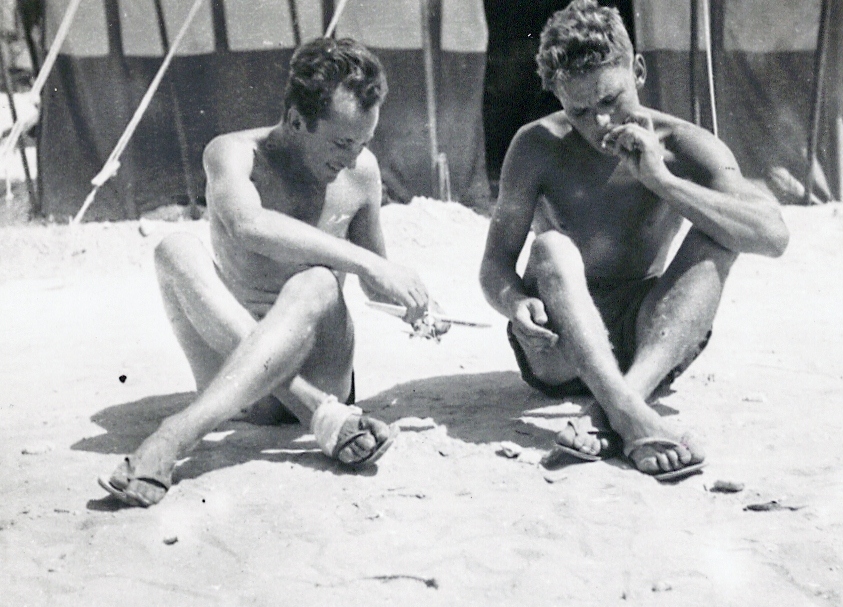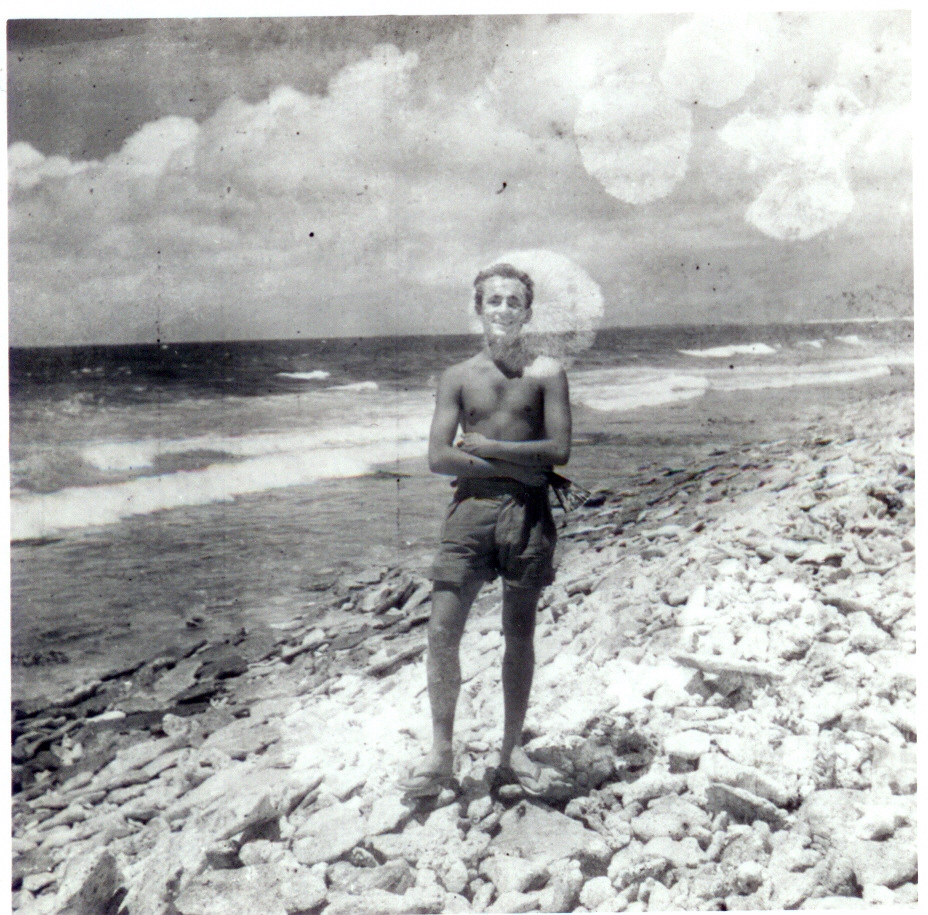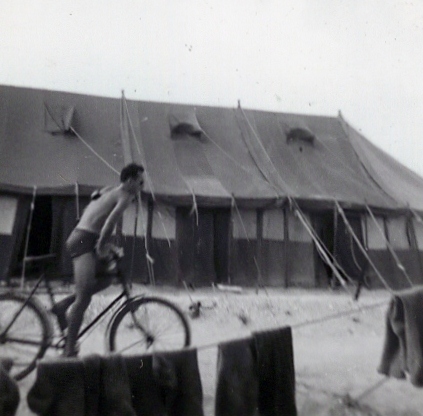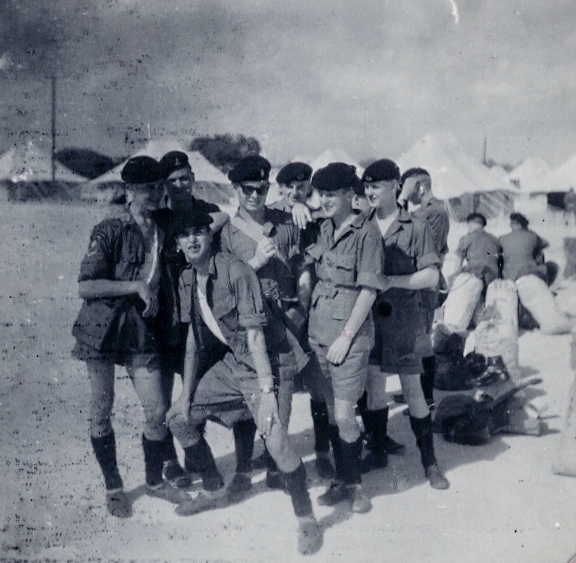Becky Alexis-Martin, Research Fellow, Department of Geography, University of Southampton @CalamityCake
Nuclear testing is often portrayed as a bombastic process, overshadowed by the devastating majesty of mushroom clouds and described in terms of annihilation or dramatic uncertainty. This is understandable, given the inherently destructive nature of nuclear weapons. However, my aim is not to sensationalise the British nuclear test series, but instead to provide a thought-provoking insight into the daily routines and experiences of the soldiers who travelled far from their families and homes to test the bomb.
Here, I share two personal narratives that describe some of the typical experiences of living within a military camp community, during British nuclear testing from 1952 to 1963. These particular communities and timescales are of interest to me due to being prior to the consolidation of the US-UK Mutual Defence Agreement. After 1963, much British nuclear testing was moved to Nevada, USA. However, prior to this, testing occurred on remote South Pacific British colonies. Therefore, some of the men toured Emu Field, across the desert of the Australian outback. Others visited Montebello Island near Australia; or Christmas Island, which is nestled within the Pacific Ocean. I have been told during conversations that “…people didn’t even travel to Spain” at this time, so I can imagine how exciting it must have been for the soldiers to have the opportunity to travel internationally. I personally still remember that precise moment when I stepped off an aeroplane for the first time, my own feet touching the burnished tarmac of Malaga airport. This was also the first chance for some of these men to leave their local communities. They travelled away from the tightly-knit social regulation of family and life-long friends, away from everything familiar, whilst jumbled up into regiments with a random assortment of other British soldiers. This the first time that many of these men would be able to define themselves on their own terms.

This piece explores two different personal accounts of travelling to Christmas Island. Whilst historically a colony, Christmas Island gained independence from the UK on 12th July 1979 and is now known as the Republic of Kiribati. It was the site of the Grapple test series from 1956 to 1958. In total, Operations Grapple X, Grapple Y and Grapple Z included nine nuclear detonations and enabled the UK to be recognised as the third nation to possess thermonuclear weapons. The first account describes the experiences of Ron, a member of the Royal Engineers regiment who had previously toured Germany before travelling by ship to Christmas Island on Boxing Day 1957, whereas the second account explores the experiences of Peter, a RAF Senior Aircraftsman (SAC) who flew for the first time on his first tour to Christmas Island in March 1958.
My first veteran, Ron, decided to join the army immediately after leaving grammar school. He told me “I left home in 1954, when I was sixteen. I’d lived away…on camp for a couple of years anyway”. He had completed his military training by the summer of 1957 and had experienced his first tour of Germany, before returning to his home unit in Rippon, Yorkshire. After travelling home for Christmas, he was redeployed to Christmas Island on Boxing Day in 1957. His experience was shared uniquely by his unit, as only the Royal Engineers travelled en-masse by boat. “The whole unit went on a specially chartered train to Southampton, all thousand of us, then onto the boat and off we went…”. The young soldiers shared facilities in the hull of ship, sleeping in bunks that were three to four beds high. “The ship got out of Southampton and then trundled off into Atlantic. Most people were seasick for the first week, until reaching the Bay of Biscay. I was lucky though, as I was on the top bunk and wasn’t sea sick. The first week there was no queue for breakfast because of the seasickness. It was great until people started to recover, then you can imagine the queues”. I was told “There was tombola to keep us entertained and guard duties to keep us busy…We’d practice shooting on deck, throwing floating things over the side to aim at…”. The ship refuelled at Curacao, then travelled through the Panama Canal, with a stop-off at Panama City. Ron revealed a little about it. “We had a night out in Panama, we hit the bars and then the strip clubs…”. Hangovers must have been nursed as ship left the docks, and began venture across the Pacific Ocean on route to its final destination.
 Initially unbeknownst to Ron, this ship also had an additional cargo of veterans’ wives and families. He told me a little more about this, and he said “Much of it was a publicity stunt. The boat went out with us all, and returned with the soldiers who were currently there. They were able to meet up with their families on the ship, and to have a cruise home together which was paid for by the MOD. I didn’t see many of them, I think we were kept separately”. Whether it was a generous gesture, or a way to publically humanise the soldiers and separate them from their work, it must have been incredible for these men to have had such an unanticipated reunion. The regiment arrived in January 1958 after three weeks of travelling. The boat had to anchor offshore, and soldiers were shipped onto the island by landing craft.
Initially unbeknownst to Ron, this ship also had an additional cargo of veterans’ wives and families. He told me a little more about this, and he said “Much of it was a publicity stunt. The boat went out with us all, and returned with the soldiers who were currently there. They were able to meet up with their families on the ship, and to have a cruise home together which was paid for by the MOD. I didn’t see many of them, I think we were kept separately”. Whether it was a generous gesture, or a way to publically humanise the soldiers and separate them from their work, it must have been incredible for these men to have had such an unanticipated reunion. The regiment arrived in January 1958 after three weeks of travelling. The boat had to anchor offshore, and soldiers were shipped onto the island by landing craft.
Ron described the soldier’s accommodation on the island in no uncertain terms “The tents were very primitive. We slept on camp beds, with metal legs to clip in, about 6 to 8 inches off the ground. The tents were big, with at least ten people in each tent. We were provided better beds later on…It was the way things worked, occasionally the supplies arrived before the soldiers”. He shared a disconcerting tale about the local wildlife. Large land crabs were abundant on Christmas Island, and “…they crawled into the tent and crawled over you at night”. His solution to this problem was to prop up his bed on jerry cans at night and to hope that he didn’t roll out in his sleep. We talked about day-to-day life on camp, and he said that whilst the main northern camp had washing facilities, the southern camp did not. The soldiers were provided with salt-water lathering soap and instructed to wash in the sea. He said “Think of all those naked young men running into the sea, it was quite a sight!”. I was momentarily lost for words, before bursting into laughter and jokingly asking for photographic evidence.
There was a cinema, a mess and a church. He was proud to tell me that there were two women from the Women’s Royal Voluntary Service (WRVS) who were permanent residents on camp. They had their own accommodation hut and were described by him as “matronly types”. Ron didn’t have much to do with the local population, as the locals lived mainly around the port. We talked leaving the island. He said that he only left twice during his time there, and told me about an unusual example of camp solidarity when he attended a funeral, a burial at sea away from the island. He was required to participate and I asked him if he knew anything about the deceased. He told me “I don’t know why he died, I just had to do the honours”. No questions were asked. The second time Ron left the island was more cheerful, as all the soldiers were provided with a holiday, and those on Christmas Island were sent to Hawaii. He therefore left Christmas Island for a week of relaxation, but ended up staying for an extra week because the plane “conked out”. This plane was also used to pick up supplies, such as fresh fruit and vegetables. When I asked about the food on camp, he described it as “normal” for the time. I told him I was interested in his day-to-day life, but somehow our conversation diverged. Instead, we talked about managing risks to health, and he described the white powdery anti-malaria tablets that were prescribed with each meal. He also told me that the entire camp was “zapped” daily by an aeroplane spraying DDT to kill mosquitoes. He said it was commonplace at the time, but he was concerned about the effects of inhaling biocide.
 I wanted to know how Ron spent his free time, and we talked about how the lack of local travel restrictions on the island. “I used to go swimming, go walking, I’d borrow a 4×4 and take off to a lagoon in the middle of the island”. He told me that learnt to drive without a licence, whilst working for a scientist from Aldermaston. He would tow and set up the generators for the scientist’s cameras. There also were no petrol stations, just jerry cans of petrol which were emptied and left on the side of the road, and were later re-filled by another soldier. Unsurprisingly, the soldier’s work and life seem deeply intertwined.
I wanted to know how Ron spent his free time, and we talked about how the lack of local travel restrictions on the island. “I used to go swimming, go walking, I’d borrow a 4×4 and take off to a lagoon in the middle of the island”. He told me that learnt to drive without a licence, whilst working for a scientist from Aldermaston. He would tow and set up the generators for the scientist’s cameras. There also were no petrol stations, just jerry cans of petrol which were emptied and left on the side of the road, and were later re-filled by another soldier. Unsurprisingly, the soldier’s work and life seem deeply intertwined.
The last thing we spoke about was family. I asked him if he missed his parents whilst he was on tour, but he’d previously left home at sixteen. Letters were written to the soldier’s families by the commanding officer. He said “these letters explained where we were and what we were doing, for instance, constructing buildings or repairing roads. My mother kept mine – I discovered them in her home after she passed away. I still have them”. Ron also wrote letters to his mother himself, and posted some more unusual souvenirs of his experience. “I used to post coconut shells back to England – you’d just write the address on the shell”. I asked for his final thoughts on the experience at the time, and he said to me “You can’t imagine…it was so exciting”. However, in the years that have accumulated since atomic testing, his perspective has changed. He worries about the health of his contemporaries and the impact upon their families. He has requested his own military medical records with little success. Whilst he is healthy, he worries about the availability of information, and wonders whether this material has been intentionally misplaced rather than lost. I thanked Ron for sharing his experiences with me and wished him well.
You can’t imagine…it was so exciting”. However, in the years that have accumulated since atomic testing, his perspective has changed. He worries about the health of his contemporaries and the impact upon their families.
My second veteran, Peter, was called up for National Service. His first posting was in 1957, to RAF Stanbridge for a year of training before travelling to Christmas Island. RAF Stanbridge was an attachment of Bletchley Park during the Cold War. He described Stanbridge to me as “…behind a fence, everything (the facilities for the soldiers) was outside, and the RAF police were armed, which was unusual in those days – Even the police didn’t know what we did”. It sounds like an interesting but formidable environment. Peter told me a story about his trip for a medical before travelling to Christmas Island. He was told to report to RAF Wroughton hospital, to have a small scar examined from surgery during 1949. He told me that he had been “on sick” a couple of times previously, due to pain from this scar, so this seemed reasonable. However, he described his surprise at being retained for medical monitoring. “I went, and I was in there for four days – they didn’t let me shave and then four days later they discharged me. I received a medical before leaving. They monitored my blood pressure, pulse, temperature, took a couple of blood samples”. Peter continued to tell me about his first experience of travelling, “I had never flown before I travelled to Christmas Island. I was notified about a week in advance. I was told to go to London airport with my coat and kit bag… we travelled with everything. There were men with overcoats and gloves travelling to a tropical island. Can you imagine!”. He said that he didn’t know anyone when he arrived at the airport, but that he quickly made friends with some of the other servicemen on the flight. He flew with British Overseas Airways Corporation (BOAC), the forerunner of British Airways. The flight was palatial, as BOAC was the “posh airline of the day, proper china and glass and all that – none of the plastic stuff”. Peter flew from London to New York, then from San Francisco and beyond with PanAm (Pan-American Airlines). When he arrived in San Francisco he was given the option of either remaining in the airport, or taking a guided coach tour of the city with the other soldiers. He recalled that it was a hot day and that neither choice sounded appealing –instead, he made the decision to sneak out of the airport with another soldier, after the other men had left for the coach tour. They hadn’t got far before they were stopped by local policemen. They asked to go somewhere nice, and were given a lift to a small town near the airport called San Bruno. Peter told me “We walked into the bar and felt like stars for the day. A couple of expats came up to meet us, and there were some incredible stories. We got quite drunk. When we left, we called a taxi back to the airport, and discovered that our taxi had already been paid for. Everyone else returned from the coach trip looking glum, so we had to be quiet about our adventure”. I asked him how he would describe the travelling experience, and he said “It was an adventure, a luxury holiday across the world”.
The health and safety officer said to them that they would receive no more radiation than from an x-ray, during their time on Christmas Island. They were told to face away from any detonations, and to cover their eyes with the palms of their hands.
Upon arrival on Christmas Island, Peter initially lived in a transit tent, before being moved to the JLC line, which he described as being the nerve centre of the island. He shared a three berth tent, specifying that there were no two berths due to the historical prohibition of homosexuality. His environment was spartan “You were given a camp bed, which was made of springs with material stretched across it. We had to keep them off the ground, otherwise you’d wake up in the night with a land crab on your chest – they sought out the warmth of your body”. It was a military offence to deliberately kill a land crab, primarily because they scavenged rubbish, but also because thousands of bluebottles bred within the shells of the dead ones. I was rapt as Peter continued to describe them as “…big old things. They could open a coconut – they would get their claws into the indents at the top and get them open. People didn’t like them, but they did you no harm unless you annoyed them, and then they would spit at you”. My eyes widened in surprise at the spitting crabs, and he chuckled at my reaction, before continuing to say “There’s a lot you don’t know! The Fijians called them Laro and they ate them – we didn’t though”. Peter attended an induction at the open-air cinema when he arrived on the island. He said that for soldiers, radiation was just another piece of jargon. The health and safety officer said to them that they would receive no more radiation than from an x-ray, during their time on Christmas Island. They were told to face away from any detonations, and to cover their eyes with the palms of their hands. During this briefing, the soldiers were also warned to protect themselves from sunburn and sunstroke by wearing regulation scarves, hats and sunglasses. Sunburn was classified as a “self-inflicted injury” by the forces. However, on return from his briefing, Peter was informed by his own duty officer that wearing his sunglasses would weaken his eyes. Peter felt obliged to listen to him, despite the conflict of available information.
Peter celebrated his twentieth birthday one week after arrival, and his description of this provided an interesting insight into camp social culture. He told me “there were no spirits available for us lads, only the officers had spirits, so we got drunk on warm tinned Guinness and brandy. The Guinness was out-of-date and the refrigeration system had broken”. There was a disparity between the experiences of the soldiers and the officers. The senior ranks relaxed and drunk Tom Collins and Grapple Sling cocktails in the officers’ facilities, delicate combinations of gin or whisky with tonic water, lemon and sugar syrup. Whilst the officers enjoyed civilised socials, the troops were attempting to make their own potent moonshine to supplement their “tinnies”, which was brewed in gallon jars that were covertly buried in the sand beneath their tents.
 There was a designated mess tent, where the soldiers ate from utilitarian metal trays with compartments for each type of food. Peter recalled that “if you weren’t careful with your tray, your custard and gravy would escape their respective compartments and combine. The food was fairly normal, but we did have to pick steam flies (cockroaches) from the bread sometimes. It was the first time I ate sweet potatoes, every day was the same, you had breakfast, dinner and lunch”. He told me that whilst the soldiers had one portion per meal, the Fijian community who were working on camp could return multiple times for further helpings of food. I wondered if this was because their work was more arduous, or if it was an attempt to improve local community relations. The Fijian community were general labourers, emptying the Elsans (chemical toilets), which Peter described as “pretty revolting”. Whilst the soldiers enjoyed meeting others at the NAFFI, Peter told me that you “stuck to your own lot” and didn’t fraternise with the locals.
There was a designated mess tent, where the soldiers ate from utilitarian metal trays with compartments for each type of food. Peter recalled that “if you weren’t careful with your tray, your custard and gravy would escape their respective compartments and combine. The food was fairly normal, but we did have to pick steam flies (cockroaches) from the bread sometimes. It was the first time I ate sweet potatoes, every day was the same, you had breakfast, dinner and lunch”. He told me that whilst the soldiers had one portion per meal, the Fijian community who were working on camp could return multiple times for further helpings of food. I wondered if this was because their work was more arduous, or if it was an attempt to improve local community relations. The Fijian community were general labourers, emptying the Elsans (chemical toilets), which Peter described as “pretty revolting”. Whilst the soldiers enjoyed meeting others at the NAFFI, Peter told me that you “stuck to your own lot” and didn’t fraternise with the locals.
We talked about his journey home on the Captain Cook. He described the ship as a “a rust bucket, I think it was the last trip it ever did…”. He also experienced a night in Christabel, Panama. “It was rough…a Caribbean-type port and all the locals were skint. They latched onto us for anything they could get. We had a few beers, and a few blokes got drunk and ended up in places they shouldn’t have”. Following this, the ships lined up to travel through the Panama Canal. The merchant ships had organised for the nuclear veteran’s ship to travel first and lead the way through the canal, as a mark of respect to the soldiers. The final stop was Curacao. Peter said that “It (the ship) was only for service-people, but we were all from different parts of the island…Whilst travelling, we talked and discovered that different people in different places wore different things”. He pauses to contemplate whether this was because of differences in radiation protection need, or due to experimentation by the British government. A big question, and not one that I felt qualified to try to answer. The ship docked in Southampton on return. Peter said “My old man had a factory there so I could dump my stuff at his place. My officer told me to find myself some lodgings and not to come back in uniform. I had to find civvy digs (civilian housing), it was like working for the government. Before Peter left, I asked him how he felt about being a nuclear test veteran, and he told me “I felt privileged to see something that no one else had, it was a unique experience”.
Before Peter left, I asked him how he felt about being a nuclear test veteran, and he told me “I felt privileged to see something that no one else had, it was a unique experience”.
Both Peter and Ron’s stories of time spent Christmas Island share parallels, but each also has a uniqueness which has been determined by that man’s own personal history and positionality. What is recalled and what is forgotten, what is significant or trivial to each individual. It has been a privilege to talk to both men, and I’m looking forward to approaching their discourse with an academic gaze as my research progresses.
Becky Alexis-Martin is a Research Fellow in Human Geography at the University of Southampton. Her research interests are focused around the human experiences of the international nuclear community, from the atomic veterans to the women of Chernobyl. She is the Principal Investigator of Nuclear Families, an Aged Veterans Fund supported project which explores the lives of the British Nuclear test veterans and their families.
[Featured images, credit R.Watson and the BNTVA archive]
